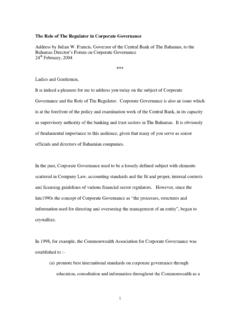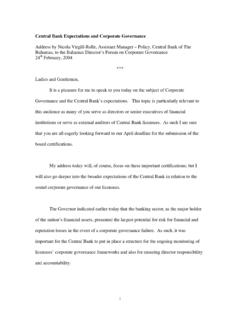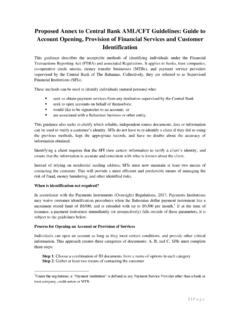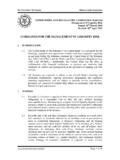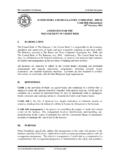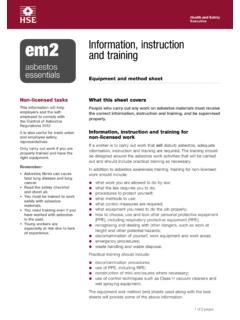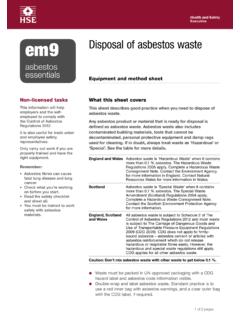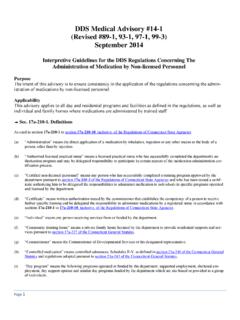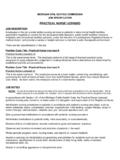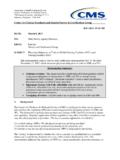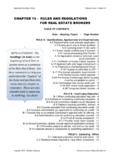Transcription of SUPERVISORY AND REGULATORY GUIDELINES: Corporate ...
1 The Central Bank of the Bahamas Corporate Governance BANK SUPERVISION DEPARTMENT Page 1 of 25 SUPERVISORY AND REGULATORY GUIDELINES: PU44-0508 Corporate Governance Guidelines Issued: 13 December 2001 Last Amended: 8 May 2013 GUIDELINES FOR THE Corporate GOVERNANCE OF BANKS AND TRUST COMPANIES LICENSED TO DO BUSINESS WITHIN AND FROM WITHIN THE BAHAMAS 1. INTRODUCTION The Central Bank of The Bahamas ( the Central Bank ) is responsible for the licensing, regulation and supervision of banks and trust companies operating in and from within The Bahamas, pursuant to the Central Bank of The Bahamas Act, 2000 ( the CBA ) and the Banks and Trust Companies Regulation Act, 2000 ( the BTCRA ). Additionally, the Central Bank has the duty, in collaboration with financial institutions, to promote and maintain high standards of conduct and management in the provision of banking and trust services.
2 All licensees are expected to adhere to the Central Bank s licensing and prudential requirements, ongoing SUPERVISORY programmes and REGULATORY reporting requirements, and are subject to periodic on-site examinations. Licensees are expected to conduct their affairs in conformity with all other Bahamian legal requirements. 2. PURPOSE Corporate governance refers to the processes, structures and information used for directing and overseeing the management of an organization. In general, Corporate governance involves the relationships between an organization s Board of Directors (the Board), management, shareholders and other stakeholders, including its clients and employees.
3 It provides the structure through which the objectives of the organization are determined, the strategies by which those objectives are developed and implemented, and the means by which the performance of the organization to achieve those objectives is monitored and controlled. Corporate governance processes will differ from organization to organization. However, the fundamental elements of good governance always include active concern about, understanding of, and diligent discharge of responsibilities in a prudent manner. The care, diligence, skill, and prudence exhibited by a financial institution s directors and senior management has a critical influence on its The Central Bank of the Bahamas Corporate Governance BANK SUPERVISION DEPARTMENT Page 2 of 25 viability, safety and soundness; its ability to execute its business strategy and achieve its business objectives; and its ability to engender confidence in and protect the interests of its depositors, creditors and other stakeholders.
4 For banks and trust companies, Corporate governance relates to the manner in which the business affairs of each individual organization are directed and managed by its board of directors and senior management, and for branches of foreign banks, by the senior management of the parent foreign bank. For all of these organizations, it also includes the effective management of compliance with applicable laws, regulations and guidelines. Unlike other companies, these organizations are generally highly leveraged and most of the resources used by them to conduct their businesses belong to others, in particular to their depositors and other clients. Also unlike other companies, the operations of individual financial institutions can have systemic impact on the financial system as a whole.
5 Consequently, as effective governance promotes the general stability and successful functioning of the overall financial system, the Central Bank of The Bahamas (the Central Bank ) expects the Corporate governance processes of its licensees to be effective and of a high standard. These Guidelines focus on accepted best practices for effective organization-wide Corporate governance and risk management. Good governance is not only essential to the operating effectiveness of an organization; it is good business and can enhance the reputation of that organization. In addition, good Corporate governance is often associated with sound and profitable Corporate performance. Consequently, it is sound business practice for an organization to be able to demonstrate at any point in time that it is adhering to the principles of an effective Corporate governance regime.
6 As such, disclosure of information about the organization to the public, shareholders and investors, where appropriate, should include a summary description of the licensee s Corporate governance process and risk management program, in addition to any required financial and other disclosures. 3. APPLICABILITY These Guidelines apply to all banks and/or trust companies and branches of foreign banks [the licensee(s) ], except nominee trust companies or restricted trust companies whose operations are limited to conducting business on behalf of one client or clients who are members of the same family. These Guidelines set out the minimum standards that the Central Bank expects its licensees to adopt in respect of their Corporate governance.
7 The Guidelines are based on the premise that the directors are stewards of the organization, responsible for providing overall direction and oversight, and that senior management is responsible for carrying out the day-to-day operations of the organization and implementing an appropriate governance process and control program designed to produce a sound and profitable organization. The Central Bank of the Bahamas Corporate Governance BANK SUPERVISION DEPARTMENT Page 3 of 25 These Guidelines are not intended to be prescriptive, but to provide direction and basic principles from which a Corporate governance process can be developed and implemented, based on the unique character of each licensee.
8 Failure to adhere to the basic principles set out in these Guidelines may call into question whether the licensee continues to satisfy the criteria necessary for the continuation of licensing. Such failure may also raise questions regarding the suitability of the members of the Board and senior management. Licensees that are part of large international financial groups may be able to take advantage of the availability of group-structured governance processes that are generally in keeping with the basic principles articulated in these Guidelines. If the Board of a licensee chooses to put in place alternative measures, it must demonstrate to the Central Bank that such alternative measures have at least an equivalent effect on ensuring sound Corporate governance.
9 Where a licensee is incorporated in The Bahamas and is a publicly listed company, it will also have to meet standards set by the Securities Commission of The Bahamas. In the event that a disparity exists between the standards set for such a company by the Central Bank and the Securities Commission, the higher of the two standards will have to be met by the licensee. These Guidelines are to be read in conjunction with the following guidelines that relate to issues concerning the Board: a. Guidelines for Assessing the Fitness and Propriety of Applicants for Regulated Functions; b. Guidelines for the Minimum Physical Presence Requirements; and c. Guidelines for Managed Licensees. 4. THE PROCESS OF Corporate GOVERNANCE Generally, the Board of a licensee should comprise (except where specific exemption has been granted) both executive and non-executive members, as appropriate to the organisation's needs, who are able to act independent of undue influence from internal and external sources.
10 An individual may hold no more than four non-executive directorship positions in licensees of the Central Bank. However, the Bank may make an exception where a licensee is a part of a banking group that comprises two or more licensees, if the individual serves as a non-executive director only for that banking group. Where an individual serves as a non-executive director for various entities within a banking group, comprising two or more licensees, such appointment will be counted as one of the four permitted by the Central Bank. The Central Bank of the Bahamas Corporate Governance BANK SUPERVISION DEPARTMENT Page 4 of 25 The Board should separate the roles of Chairman of the Board and the Chief Executive Officer (CEO)/Senior Official I.

